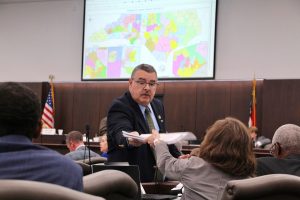RALEIGH, N.C. (AP) — A pair of northeastern North Carolina legislative districts can remain intact, a federal judge ruled Tuesday, rejecting Black voters’ claims that state Republicans illegally manipulated the boundaries to prevent them from electing their favored candidates.
Ruling after a trial held nearly eight months ago, U.S. District Judge James Dever sided with GOP legislative leaders who were sued in November 2023 over two state Senate districts in a statewide map the General Assembly approved weeks earlier.
The two plaintiffs — one of them now a Democratic state House member — argued that the lines violated Section 2 of the U.S. Voting Rights Act through race-based discrimination, and that the lawmakers should have created a majority-Black district instead.
The lines cover close to 20 counties that include a region known as the “Black Belt,” where the African American population is significant — reaching a majority in some counties — and politically cohesive. Last November, white Republicans were elected to the two district seats.
The partisan makeup of the Senate is critical for the prospects of both parties. Republicans currently hold 30 of the 50 seats — the minimum required for a veto-proof majority. Senate Democrats could uphold Gov. Josh Stein’s vetoes with one more seat.
In a 126-page order, Dever wrote that plaintiffs Moses Matthews and Rep. Rodney Pierce lacked standing to challenge one Senate district because neither lived in that district. Otherwise, he said, they failed to provide enough evidence to prove that the lines diluted Black voting power.
Dever said that Republican lawmakers did not have access to racial data in their mapping computers in part because North Carolina redistricting litigation during the 2010s determined that racially polarized voting in the state was not legally significant.
He noted that 2024 elections based on statewide House and Senate maps approved in 2023 resulted in African American candidates winning 38 of the 170 seats — a proportion in line with the state’s Black population, he wrote.
“This case does not involve the General Assembly engaging in race-based districting or the odious practice of sorting voters based on race,” Dever wrote, citing a recent U.S. Supreme Court ruling. He said the case record demonstrates northeastern North Carolina communities include Black voting blocs that form coalitions with other racial and ethnic groups to elect their favored candidates.
“Black voters in northeast North Carolina and throughout North Carolina have elected candidates of their choice (both white and black) with remarkable frequency and success for decades,” wrote Dever, who was nominated to the bench by President George W. Bush. ”Plaintiffs ignore the progress that North Carolina has made over the past 60 years and seek to use Section 2 to sort voters by race in order to squeeze one more Democratic Senate district into the map.”
Attorneys for Pierce and Matthews didn’t immediately respond Tuesday to emails seeking comment on the ruling, which could be appealed to the 4th U.S. Circuit Court of Appeals. In 2024, both Dever and a 4th District panel declined to block the use of the two districts while the case went to trial.
Republicans have said that lawfully partisan considerations inform their decision-making on redistricting.
Republican state Senate leader Phil Berger said on X that the court on Tuesday confirmed that the General Assembly “was right not to use race in its redistricting process” and that the Voting Rights Act “can’t be weaponized to make up for the shortcomings of the Democratic Party.”
The northeastern North Carolina Senate districts also are being challenged within a broader redistricting case that remains before a panel of three federal judges. The trial, which involved two lawsuits alleging racial gerrymandering in a handful of U.S. House and state Senate districts approved in 2023, concluded in July. No ruling has yet been entered. Candidate filing begins in December for General Assembly primary elections scheduled in March.
By GARY D. ROBERTSON
Associated Press

